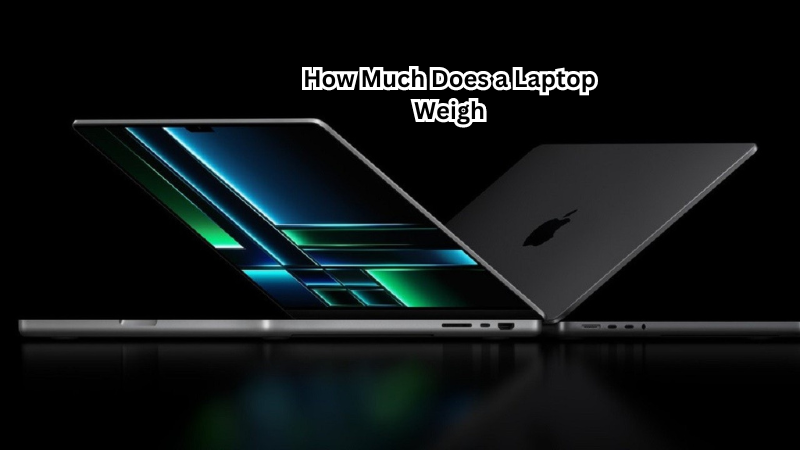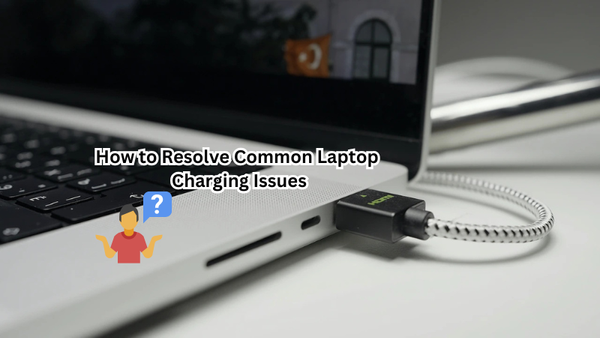One key factor often overlooked when considering the purchase of laptop computers is the weight. Laptops' weight can vary significantly based on their purpose and hardware components. For instance, gaming laptops weigh more due to the inclusion of advanced graphics cards and cooling systems.
These performance laptops are typically heavier, as they prioritize power with components like Intel Core processors. On the other hand, models designed for extended battery life may weigh less, offering a balance between portability and function.
Most laptops on the market today aim to strike a balance between performance and mobility, but understanding the specific needs, such as whether a gaming or business-focused device is required, will influence the ideal choice for each user.
Understanding Laptop Weight Importance
The weight of a laptop directly affects its portability and user comfort. For example, a heavy laptop can strain your arms when carrying it around, making it cumbersome to use while on the go. Moreover, a lightweight model can be a significant advantage if you frequently travel with your laptop, especially when navigating through airports or using public transportation.
Additionally, the weight of a laptop also impacts its overall size and dimensions, with lighter laptops often being slimmer and more compact in design. This is particularly relevant for those who value sleek and slim devices that are easy to transport and store. Also, the weight of a laptop can affect its battery life, as heavier models with larger screens and powerful hardware tend to drain the battery faster.
Average Weight of Different Types of Laptops
The average weight of a laptop can vary significantly depending on its intended use, hardware specifications, and design. Generally, laptops with larger screens and more powerful processors tend to be heavier, while those with smaller screens and less powerful hardware are lighter.
- Ultrabooks: These are ultra-slim, lightweight laptops designed for portability. The average weight of an ultrabook ranges from 2-3 pounds (0.9-1.4 kilograms). Ultraportable laptops are ideal for professionals who prioritize mobility and don't require heavy processing power.
- Gaming Laptops: Gaming laptops often come with advanced hardware, including dedicated graphics cards, contributing to their weight. The average weight of a gaming laptop can range from 5-10 pounds (2.3-4.5 kilograms), depending on the specifications and screen size.
- 2-in-1 Laptops: These versatile devices can function as both a laptop and a tablet, making them popular among those who value flexibility. The average weight of a 2-in-1 laptop can range from 3-5 pounds (1.4-2.3 kilograms), depending on its screen size and specifications.
- Traditional Laptops: Traditional laptops, also known as clamshell laptops, come in a variety of sizes and weights. On average, they weigh around 4-6 pounds (1.8-2.7 kilograms), but this can vary greatly depending on the screen size and hardware specifications.
An average laptop weight is a crucial factor to consider when purchasing a new device. And convertible laptops, such as 2-in-1s, offer the best of both worlds with their lightweight and versatile design. A light laptop can make a significant difference in daily usage, especially for students, professionals, and frequent travelers.
How Much Does a Laptop Weigh
Several factors contribute to the weight of a laptop. Some of the most common ones include:
Materials Used
The primary material used to construct laptops is aluminum, known for its lightweight yet sturdy properties. However, premium models may feature magnesium alloy or carbon fiber that further reduces weight without compromising durability.
On the other end of the spectrum, budget-friendly laptops often utilize plastic components, which can add more weight but are still relatively lightweight compared to desktop computers.
Size and Type of Components
The size and type of components used in a laptop, such as the processor, graphics card, battery, and storage drives, can significantly impact its weight. For example, a powerful processor with multiple cores and dedicated graphics cards will add more weight compared to a basic processor without dedicated graphics capabilities.
Screen Size
The screen size is one of the most significant contributors to the overall weight of a laptop. A larger screen can add more weight due to additional hardware requirements such as a bigger battery and sturdier frame. On average, laptops with 13-14 inch screens are lighter than those with 15-17 inch screens.
Additionally, the type of display panel can also affect weight. For instance, a laptop with a traditional LCD screen will be heavier than one with an LED or OLED display.
Battery Capacity
A laptop's battery capacity is directly related to its weight, with larger batteries being heavier. As battery life is a crucial factor for many users, manufacturers often strive to strike a balance between battery capacity and weight.
Furthermore, the type of battery used can also impact weight. For instance, traditional lithium-ion batteries are lighter than older nickel-cadmium or nickel-metal hydride batteries.
Additional Features
Various additional features such as touchscreens, backlit keyboards, and fingerprint scanners can also add to the overall weight of a laptop. While these features may enhance usability, they can also contribute to a laptop's weight.
These factors highlight the complexity of choosing a laptop based on weight alone. It is essential to consider all aspects, including your intended usage and budget, before making a decision. Whether you prioritize portability, performance, or a mix of both, understanding the various components that contribute to a laptop's weight can help you make an informed decision and select a device that perfectly aligns with your needs.
How Laptop Weight Impacts Graphics Design Work
For graphics designers, the weight of a laptop is an essential consideration as it directly affects their productivity and creativity. A lighter laptop means they can easily carry it to meetings or work on the go without being weighed down. It also allows them to set up in different locations quickly, such as coffee shops or co-working spaces, where space may be limited.
Moreover, when working with design software that requires heavy computing power, a lightweight laptop may not have the necessary hardware specifications to handle the workload efficiently. In this case, a slightly heavier laptop with more powerful components would be more suitable for graphic design work.
Additionally, some graphic designers prefer larger screens for better visual clarity and workspace. This often means opting for a heavier laptop to accommodate the larger screen size.
Choosing the Right Weight for Your Needs
When it comes to laptops, there is no one-size-fits-all solution. The right weight for you depends on your individual needs and usage. If you primarily use your laptop for basic tasks such as web browsing, email, and word processing, a lighter ultrabook or traditional laptop may be more suitable.
For heavy-duty tasks such as gaming, video editing, or graphic design work, a slightly heavier laptop with more powerful hardware may be necessary. While it may not be the most lightweight option, it will provide the necessary performance to handle demanding tasks efficiently.
Ultimately, the right weight for your needs should strike a balance between portability and functionality. Consider all factors mentioned above before deciding to ensure you choose a laptop that meets your specific requirements.
Tips for Reducing Laptop Weight
- Consider an ultrabook or 2-in-1 laptop if you prioritize portability.
- Look for laptops with aluminum or magnesium alloy construction for a balance between weight and durability.
- Opt for a smaller screen size if you don't need a larger workspace.
- Choose a lightweight battery type, such as lithium-ion, over heavier alternatives like nickel-cadmium or nickel-metal hydride.
- Avoid unnecessary additional features that can add weight to your laptop.
By understanding how various factors contribute to the weight of a laptop and considering your specific needs, you can find the perfect device that meets all your requirements without being too heavy on your shoulders.
Comparing Mac And Pc Weights
When it comes to laptop weight, Mac and PC laptops have some key differences. Mac laptops are known for their sleek and lightweight design, often weighing less than their PC counterparts. This is due to the premium materials used in construction, such as aluminum and carbon fiber.
In comparison, PC laptops vary greatly in weight depending on the brand, model, and specifications. While some may be lighter than Mac laptops, others may be heavier due to different material choices or larger components.
It's important to note that both Mac and PC laptops offer a range of options in terms of weight, so it ultimately comes down to personal preference and specific needs when choosing between the two. By considering all the factors mentioned above, you can find the perfect laptop that meets your requirements. Whether it's for work, travel, or leisure, a well-chosen laptop can enhance your productivity and improve your overall experience.
Best Light Weight Laptops On The Market
If you're in the market for a lightweight laptop, here are some of the best options available currently:
- Apple MacBook Air: Weighing in at just 2.8 pounds, this sleek and powerful laptop is perfect for everyday use.
- Dell XPS 13: This ultrabook weighs only 2.7 pounds and offers top-of-the-line performance.
- Microsoft Surface Laptop Go: Weighing in at just 2.44 pounds, this affordable laptop is ideal for students or those on a budget.
- LG Gram 14Z90N: At only 2.1 pounds, this ultra-lightweight laptop still packs a punch with its powerful specifications.
- Lenovo ThinkPad X1 Carbon: Designed for business professionals, this laptop weighs just 2.4 pounds and offers excellent performance and durability.
With the constant advancements in technology, lightweight laptops are becoming more and more common, making it easier to find a device that meets your specific needs while also being easy to carry around.
FAQs
Is 2kg heavy for a laptop?
While 2kg may not be considered heavy for a laptop, it can still feel cumbersome to carry around for extended periods. If you prioritize portability, looking for laptops closer to 1-1.5kg would be more suitable.
Does a heavier laptop mean better performance?
Not necessarily. While some heavier laptops may have more powerful components, it's important to consider the overall specifications and individual needs when determining performance. A slightly heavier laptop with better hardware may have better performance than a lighter one with lower-end components.
How does the material of a laptop affect its weight?
The material used in construction plays a significant role in the weight of a laptop. Premium materials like aluminum or carbon fiber are often lighter but more expensive, while cheaper alternatives like plastic may add more weight to the device.
Conclusion
As we conclude our exploration of laptop weights, it's clear that understanding the weight of a laptop is pivotal when making a purchase.
The balance between portability and performance is crucial, with ultrabooks offering lightweight convenience, gaming laptops providing robust capabilities, and 2-in-1s offering flexibility. Different types of laptops cater to diverse needs, so it's essential to evaluate your mobility and performance requirements carefully.
By considering these factors, you can find the ideal laptop weight that complements your lifestyle. Remember, testing various models can be invaluable in making an informed choice, ensuring that your selected laptop meets both your personal and professional demands effectively.





